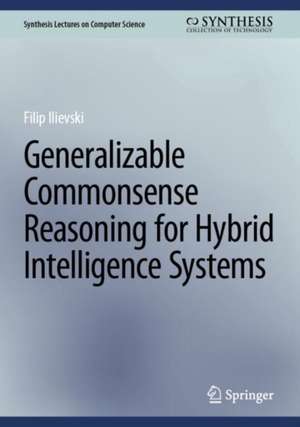Generalizable Commonsense Reasoning for Hybrid Intelligence Systems: Synthesis Lectures on Computer Science
Autor Filip Ilievskien Limba Engleză Hardback – 11 ian 2025
Din seria Synthesis Lectures on Computer Science
- 15%
 Preț: 523.07 lei
Preț: 523.07 lei - 20%
 Preț: 275.13 lei
Preț: 275.13 lei - 20%
 Preț: 280.92 lei
Preț: 280.92 lei - 20%
 Preț: 280.08 lei
Preț: 280.08 lei - 20%
 Preț: 280.73 lei
Preț: 280.73 lei -
 Preț: 421.72 lei
Preț: 421.72 lei -
 Preț: 416.54 lei
Preț: 416.54 lei -
 Preț: 454.92 lei
Preț: 454.92 lei -
 Preț: 418.07 lei
Preț: 418.07 lei -
 Preț: 487.57 lei
Preț: 487.57 lei -
 Preț: 385.33 lei
Preț: 385.33 lei -
 Preț: 141.32 lei
Preț: 141.32 lei -
 Preț: 192.05 lei
Preț: 192.05 lei - 20%
 Preț: 433.30 lei
Preț: 433.30 lei - 19%
 Preț: 455.57 lei
Preț: 455.57 lei - 19%
 Preț: 449.85 lei
Preț: 449.85 lei - 20%
 Preț: 262.84 lei
Preț: 262.84 lei - 20%
 Preț: 250.97 lei
Preț: 250.97 lei - 20%
 Preț: 246.52 lei
Preț: 246.52 lei
Preț: 275.31 lei
Preț vechi: 344.14 lei
-20% Nou
Puncte Express: 413
Preț estimativ în valută:
52.69€ • 54.80$ • 43.50£
52.69€ • 54.80$ • 43.50£
Carte disponibilă
Livrare economică 24 martie-07 aprilie
Preluare comenzi: 021 569.72.76
Specificații
ISBN-13: 9783031699733
ISBN-10: 3031699734
Pagini: 150
Ilustrații: Approx. 150 p. 35 illus. in color.
Dimensiuni: 168 x 240 mm
Greutate: 0.41 kg
Ediția:2025
Editura: Springer Nature Switzerland
Colecția Springer
Seria Synthesis Lectures on Computer Science
Locul publicării:Cham, Switzerland
ISBN-10: 3031699734
Pagini: 150
Ilustrații: Approx. 150 p. 35 illus. in color.
Dimensiuni: 168 x 240 mm
Greutate: 0.41 kg
Ediția:2025
Editura: Springer Nature Switzerland
Colecția Springer
Seria Synthesis Lectures on Computer Science
Locul publicării:Cham, Switzerland
Cuprins
Introduction.- Collaborative Commonsense Reasoning.- Adaptive Commonsense Reasoning.- Responsible Commonsense Reasoning.- Explainable Commonsense Reasoning.- Hybrid Intelligence with Common Sense.- Conclusions and Outlook.
Notă biografică
Filip Ilievski, Ph.D., is a Research Assistant Professor of Computer Science at the University of Southern California (USC) and Research Lead at the Information Sciences Institute (ISI) at the USC Viterbi School of Engineering. Dr. Filip holds a Ph.D. in Natural Language Processing from the Vrije Universiteit (VU) in Amsterdam, where he also worked as a postdoctoral researcher before joining USC. His research focuses on developing robust and explainable neuro-symbolic technology with positive real-world impact, based on neural methods and high-quality knowledge. Dr. Filip has made extensive contributions in identifying long-tail entities in text, performing robust and explainable commonsense reasoning, and managing large-scale knowledge resources.
Textul de pe ultima copertă
This book enables readers to understand the challenges and opportunities of developing trustworthy AI with commonsense reasoning skills. Commonsense knowledge is often implicit and presents a challenge for automated methods in natural language processing and question answering as the extraction and learning algorithms cannot count on the commonsense knowledge being available directly in text. As such, commonsense knowledge and reasoning has been considered the “black matter” of AI, raising concerns about the trustworthiness and applicability of AI methods in automated and hybrid applications, especially social good applications in misinformation, traffic, health, and education. This book presents dominant methods that combine neural and symbolic advances to achieve adaptivity, collaboration, explainability, and responsibility through commonsense reasoning. In addition, the book describes how these socio-technical properties of AI can facilitate a range of social-good applications like misinformation, traffic, education, and health. What makes commonsense reasoning such a unique and impactful challenge? What do cognitive and AI perspectives bring to the table? How can we approach building responsible, adaptive, collaborative, and explainable AI with common sense? And finally, what is the impact of this work on hybrid human-AI intelligent systems? This book provides an accessible introduction and exploration of these topics.
In addition, this book:
In addition, this book:
- Features broad coverage of cognitive, symbolic, and neural theories for common sense reasoning
- Integrates neural and symbolic methods for open-domain tasks that require adaptivity, collaboration, and responsibility
- Synthesizes lessons learned and provides open challenges that future research and engineering efforts need to tackle
Caracteristici
Features broad coverage of cognitive, symbolic, and neural theories for commonsense reasoning Integrates neural and symbolic methods for open-domain tasks that require adaptivity, collaboration, and responsibility Synthesizes lessons learned and provides open challenges that future research and engineering efforts need to tackle
